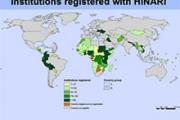HINARI: Providing access to health literature
 The HINARI Access to Research in Health programme enables low- and middle-income countries to gain access to one of the worlds largest collections of biomedical and health literature. Sudan’s Federal Ministry of Health recently celebrated 10 years of membership in the programme.
The HINARI Access to Research in Health programme enables low- and middle-income countries to gain access to one of the worlds largest collections of biomedical and health literature. Sudan’s Federal Ministry of Health recently celebrated 10 years of membership in the programme.
Access to up-to-date information
As Director-General of Sudan’s Central Medical Supplies Public Corporation, Gamal Khalafalla Mohamed Ali heads the national agency responsible for getting medical supplies to all public health institutions.
If any role requires access to reliable, up-to-date information on medicines, this is it. Dr Khalafalla’s job is to advise how to best regulate, organize and pay for medical supplies so that millions of people in Sudan have the best possible chance to stay healthy.
Policies based on evidence
Dr Khalafalla works hard to base his policies and proposals on evidence, using the best research available. But it wasn’t always that way. Twelve years ago, when he worked at the Khartoum State Ministry of Health, basing policies on evidence simply wasn’t possible.
"HINARI exposes us to the international research community. With just a click, you have access to high-quality international publications."
Dr Khalafalla, Director-General of Sudan’s Central Medical Supplies Public Corporation
Things took a dramatic turn for the better when WHO gave the Federal Ministry of Health access to the HINARI programme. “I have written many proposals, and most of these find their way to implementation. A major reason for this, I think, is the evidence that underpins the proposals,” says Dr Khalafalla. ”HINARI exposes us to the international research community. With just a click, you have access to high-quality international publications. To me HINARI is like water and oxygen; it is vital.”
A 2008 paper on “Safety-related regulatory actions for biologicals approved in the United States and the European Union” published in the Journal of the American Medical Association (access through HINARI) helped Dr Khalafalla convince colleagues in the Medicines Registration Committee to develop requirements for the registration of biological products.
HINARI has also been instrumental in Dr Khalafalla’s work to develop the syllabus for a master’s degree in public health. His proposal for the establishment of a programme in pharmacy professional development was accepted by the Sudanese Pharmacists’ Union and is now being run by the Federal Ministry of Health was also inspired by HINARI.
Other significant evidence-based proposals that have been adopted in Sudan are: a 25-year pharmacy strategic plan and the establishment of an independent medicine regulatory authority, the National Medicines and Poisons Board.
This Article is from http://www.who.int/features/2014/hinari-research-access/en/index.html
